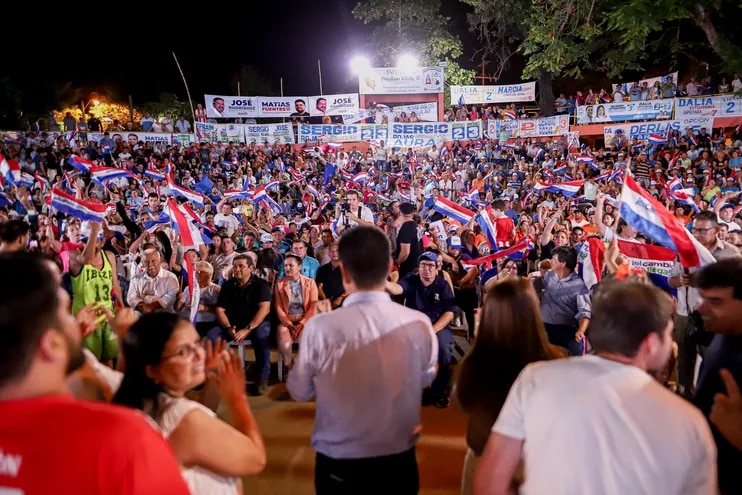Presidential Election in Paraguay – April 30, 2023

Efraín Alegre - Candidate for the Partido Liberal Radical Auténtico
Paraguayan opposition members often compare the country’s ruling Colorado Party to Mexico’s Institutional Revolutionary Party (PRI), which governed for 71 consecutive years, from 1929 to 2000. The right-wing Colorado Party ruled for 61 years—34 of them during a dictatorship—until a brief back-bench stint from 2008 to 2013. The party has been in power ever since.
Though both the PRI and Colorado Party technically won at the ballot box during their periods of dominance, their power and influence at all levels of government and in the media meant they could easily snuff out potential challengers.
Now, the Colorado Party’s dominance may be shaken in the country’s April 30 general elections—which have been shaped by a combination of anti-corruption, anti-incumbent, and pro-China sentiments. The contest will be consequential for both Paraguayan and South American foreign policy: Under new leadership, Paraguay could switch its diplomatic allegiance from Taiwan to China and will have to renegotiate a critical energy treaty with Brazil.
The two candidates leading Paraguay’s presidential polls are the Colorado Party’s Santiago Peña, a former finance minister, and centrist Authentic Radical Liberal Party leader Efraín Alegre, a longtime lawmaker. Polls in the country have been unreliable in recent elections, though; in the last presidential contest, four pollsters favored the Colorado Party candidate by more than 15 points above his actual margin of victory. “At a month and a half away, anything could happen. It’s open,” Paraguayan sociologist Camilo Soares tweeted last week about the April election.

Santiago Peña – Candidate for the Colorado Party
Alegre has benefited from corruption allegations against high-ranking Colorado Party leaders, including current Vice President Hugo Velázquez and former President Horacio Cartes, who were both added to U.S. sanctions lists for “systemic corruption” last year. Incumbent President Mario Abdo Benítez is unpopular, which could also benefit Alegre. (Abdo Benítez, also of the Colorado Party, is barred from running for reelection due to term limits.)
Alegre has earned support for his campaign promise to consider diplomatically recognizing China instead of Taiwan. Allegiance to Taiwan has long been foreign-policy orthodoxy in Paraguay—a result of the Colorado Party’s reflexive anti-communism and the sway this position has earned the country with the United States. Today, Paraguay is the last South American country to maintain full diplomatic relations with Taipei.
But some think Paraguay’s pro-Taiwan conviction could be waning. The costs of maintaining ties with Taiwan grew more visible during the COVID-19 pandemic when China prioritized friendly countries for vaccine deliveries amid an international scramble for jabs. “Many [of Paraguay’s] neighboring countries received Chinese vaccines and were much more advanced in their vaccination programs,” political analyst Julieta Heduvan told Foreign Policy.
Taiwan eventually negotiated for India to send Covaxin vaccines to Paraguay, though the contract was canceled over quality control issues. Paraguay also agreed to direct-supply deals with drug companies and through the global COVAX initiative.
Paraguay’s influential farming and ranching sectors have called for their country’s officials to improve relations with China, too, saying they are missing out on potential revenue, Heduvan and Juan Manuel Harán wrote in ReporteAsia. Other agricultural-exporting countries in Latin America have seen their economies boom from sales to China in recent years. Just last week, Honduras announced that it would switch its diplomatic allegiance from Taiwan to China, primarily over economic concerns.
Paraguay’s next president will face another major foreign-policy decision closer to home. In August, Paraguay and Brazil are due to renegotiate a treaty that governs how electricity generated at their binational Itaipu hydroelectric dam—located on the border between the two countries—is divided and sold. Itaipu generates the second-most power of any hydroelectric dam in the world.
As construction of the dam was underway in the 1970s, the countries agreed to be co-owners of the project if Brazil covered more of its upfront costs and Paraguay paid Brazil back over time. Paraguay would sell any electricity it did not use to Brazil at a controlled price rather than selling it to other buyers at the market rate. The terms of the 1973 deal were for 50 years, and its time will be up in August. Many Paraguayans feel they got a poor deal and see the scheduled renegotiation as the chance to correct things.
Paraguay uses only around 8 percent of the electricity it generates at Itaipu; if the country could sell its electricity on the open market rather than at price-controlled rates, it could mean a new windfall of public revenue. Fuller government coffers could be devoted to initiatives such as increased social spending and efforts to electrify transportation and other emissions-heavy sectors of the country’s economy, political analyst Cecilia Vuyk wrote in ABC Color last week.
Aware of the sensitivity of Paraguay’s grievances surrounding Itaipu—and the fact that Brazil stands to lose its favorable energy prices secured by the deal—Brazilian President Luiz Inácio Lula da Silva traveled to western Paraná to attend a ceremony in honor of the dam’s new director last week, saying he would support a new deal that “takes into account the respect Brazil needs to have for its ally, our dear Paraguay.”
Vuyk is part of a civil society group that is pushing presidential candidates to better define their positions on Itaipu. “It will be a central theme of the next government, and because of that, debate and then protagonism by all citizens will be key,” she told Foreign Policy.
Peña and Alegre both say they want to ensure good electricity prices for Paraguayans but have not provided much further detail. When a left-wing politician briefly held Paraguay’s presidency in the past, he negotiated a deal with Brazil that increased the amount Brazil paid for Paraguayan energy.
While the results of Paraguay’s election could bring about important foreign-policy changes, the country’s history of continuity stands as a caution. “While the fundamentals of this election should lead to an opposition victory, betting against the Colorado Party is never a smart money play,” Latin America Risk Report’s James Bosworth wrote last week.
Note: About 20 independent experts from the European Union are already in Paraguay coordinating the long-term observation deployment plan. 28 observers will arrive by March 27, and the head of the mission, the European Deputy Gabriel Matto, will arrive between March 30 and April 1.
A week before the completion of the elections, 40 short-term observers and a delegation of parliamentarians from the European Union will arrive.










